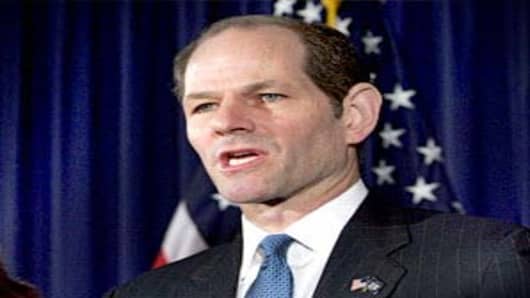But the transactions proved to be anything but safe for Mr. Spitzer, who, aides said on Monday, was weighing possible resignation.
Last week, Ms. Lewis was one of four people charged by federal prosecutors in Manhattan with operating the prostitution ring. Also arrested were Mark Brener, 62, who is accused of heading the operation; Cecil Suwal, 23, who is said to have managed it day to day; and Tanya Hollander, 36, who worked part time as a booker.
The affidavit, which was unsealed on Thursday when the four were arrested, details the secretly recorded conversations that officials said captured Mr. Spitzer’s efforts to arrange a Washington meeting with a prostitute on Feb. 13. It also describes the young woman’s report to the booking agent on her encounter with the governor, shortly after it was concluded.
The affidavit does not name the governor, nor does it name any of the other 10 men described as having purchased sex through the operation. Instead, it refers to them by number, with Mr. Spitzer, according to two law enforcement officials, listed as Client 9.
Mr. Spitzer’s cited rendezvous with the prostitute on Feb. 13 occupies five pages of the 47-page affidavit. The document recounts parts of a half-dozen conversations Client 9 had with Ms. Lewis, the booking agent, in the roughly 24 hours leading up to his meeting with the prostitute at the Mayflower Hotel.
They discussed whether his deposit would cover the young woman’s travel expenses, whether his payment had arrived — apparently by mail or overnight courier — and how she would be admitted to the hotel room he had reserved in Washington. At one point, when the booker tells him it will be a woman who went by the name Kristen, Client 9 said, “Great, O.K., wonderful,” according to the affidavit.
During the last conversation, he asked Ms. Lewis to remind him what Kristen looked like.
The conversations, according to the affidavit, were among more than 5,000 telephone calls and text messages that the federal authorities intercepted during the course of the investigation into the prostitution ring, which began last October. Investigators also seized more than 6,000 e-mail messages, bank records, and travel and hotel records, and conducted physical surveillance.
Almost lost in the tumult of the governor’s statement and the possibility of his resignation were the original allegations against the defendants said to have operated the ring.
Two of them, Mr. Brener and Ms. Suwal, are still held at the Metropolitan Correctional Center in Lower Manhattan, and on Monday their lawyers were still focused on their clients’ problems, not Mr. Spitzer’s.
Mr. Brener’s lawyer, Jennifer L. Brown, said her client “is anxious to have his day in court for a full airing of these charges and he’s looking forward to defending himself.”
Daniel S. Parker, a lawyer for Ms. Suwal, recalled that his client had, as all the defendants, entered a plea of not guilty at her arraignment on Thursday. He said Monday that she was entitled to the presumption of innocence.
“What the governor chooses to state or admit to is the governor’s business,” he said.



